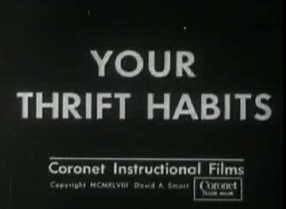Household Finance Ignorance
It's not what they say, it's what they don't say that matters.
by Eric Janszen - September 10, 2006
Once upon a time, public schools in the US tried to teach students basic principles of household finance. That was back in the day when it was believed that a strong American nation depends on a large, well-off middle class. The instructional movie "Your Thrift Habits" below, made by Coronet Films in 1948, shows high school students how to manage a personal budget to save for consumer products purchases. Along with explaining the mechanics of the quaint notion of saving, the film assumes that the high school student audience's family has a "household budget." Today, surveys show that 61% of US families either "don't have a household budget or have difficulty sticking to their budget."
Another Coronet instructional movie "Understanding The Dollar" notes that as inflation rises, initially individuals observe goods and services prices rise, making them less affordable. But not to worry, soon wages will catch up. The delay is due to "wage lag." Maybe Ben Bernanke should watch it.

Good Debt, Bad Debt Ad
It's not what they say, it's what they don't say that matters.
by Eric Janszen - September 10, 2006
Once upon a time, public schools in the US tried to teach students basic principles of household finance. That was back in the day when it was believed that a strong American nation depends on a large, well-off middle class. The instructional movie "Your Thrift Habits" below, made by Coronet Films in 1948, shows high school students how to manage a personal budget to save for consumer products purchases. Along with explaining the mechanics of the quaint notion of saving, the film assumes that the high school student audience's family has a "household budget." Today, surveys show that 61% of US families either "don't have a household budget or have difficulty sticking to their budget."
Another Coronet instructional movie "Understanding The Dollar" notes that as inflation rises, initially individuals observe goods and services prices rise, making them less affordable. But not to worry, soon wages will catch up. The delay is due to "wage lag." Maybe Ben Bernanke should watch it.

Good Debt, Bad Debt Ad
Education about basic household finance was dropped from public high school curricula in the 1980s. Is it any wonder why, twenty five years later, we have a population that by and large knows little about how to save, invest and manage credit? The video above jokes that the US government needs to issue "Debt Alerts" to keep consumers from borrowing more when national household debt levels get too high. The video is an ad for the book "gooddebtbaddebt".
I have often wondered what would happen if one of the esteemed stewards of our banking system were to put out a series of punchy 30 minute instructional films on sound household finance, aired on national television during prime time, that explain mundane concepts such as "saving" and "household budget" and states accurately that a well managed household purchases consumer goods only with cash from savings not on credit. Credit is only to be used for purchases of assets that will be worth more than the principle and interest on the loan by the time the loan is due, or for purchases such as education that will increase income.
One film can be devoted to automobile purchases. It will explain that an automobile is a depreciating asset, that a car will always be worth less than the principle and interest on the loan by the time the loan is due, and so is a bad use of credit. You can afford only the automobile that you can pay for with cash out of savings. If a car is absolutely needed for transportation to work and you do not have enough savings to buy a car with cash and have to use credit, then you need to buy the least expensive used car available to get the job done, to get you to work.
Since he's no longer employed by the Fed but is still well respected by most Americans, Alan Greenspan is my first choice as narrator for this series on sound household finance. Given the attention span of the audience, maybe we need a cartoon series, say, in the style of Mr. Magoo, with Greenspan doing the voiceover.
Alas, the US economy is now dependent on widepsread ignorance of sound household finance. If the US government made a concerted effort to impress the importance of sound household finance to the US population through the public school system or directy via mainstream media, the US economy would go into recession in short order.
That will never happen. Instead, we have the comedic versions of the message, such as the now famous Steve Martin skit, "Don't Buy Stuff You Can't Afford."
There are dozens of well intentioned serious people, from Ben Stein to Suze Orman to Laura Rowly, trying to make the same point. But they are tiny chorus of kazoos squeaking behind a 100,000 watt credit industry bull horn. As the excellent Bankruptcy Lawyer's Blog recently reported, "Consumer Debt Continues to Grow as Credit Card Solicitations Reach an All-Time High":
Comedians like George Carlin gives us his version of why we should not hold our breath waiting for this happen.
Warning: This is not a Coronet instructional film. This is George Carlin on HBO. Lots of profanity. The video was sent to us by a iTulip member and is hosted on his myspace page. Aspiring US congressional and presidential candidates, take note of the audience reaction.
Join our FREE Email Mailing List
Copyright © iTulip, Inc. 1998 - 2006 All Rights Reserved
All information provided "as is" for informational purposes only, not intended for trading purposes or advice. Nothing appearing on this website should be considered a recommendation to buy or to sell any security or related financial instrument. iTulip, Inc. is not liable for any informational errors, incompleteness, or delays, or for any actions taken in reliance on information contained herein. Full Disclaimer
I have often wondered what would happen if one of the esteemed stewards of our banking system were to put out a series of punchy 30 minute instructional films on sound household finance, aired on national television during prime time, that explain mundane concepts such as "saving" and "household budget" and states accurately that a well managed household purchases consumer goods only with cash from savings not on credit. Credit is only to be used for purchases of assets that will be worth more than the principle and interest on the loan by the time the loan is due, or for purchases such as education that will increase income.
One film can be devoted to automobile purchases. It will explain that an automobile is a depreciating asset, that a car will always be worth less than the principle and interest on the loan by the time the loan is due, and so is a bad use of credit. You can afford only the automobile that you can pay for with cash out of savings. If a car is absolutely needed for transportation to work and you do not have enough savings to buy a car with cash and have to use credit, then you need to buy the least expensive used car available to get the job done, to get you to work.
Since he's no longer employed by the Fed but is still well respected by most Americans, Alan Greenspan is my first choice as narrator for this series on sound household finance. Given the attention span of the audience, maybe we need a cartoon series, say, in the style of Mr. Magoo, with Greenspan doing the voiceover.
Alas, the US economy is now dependent on widepsread ignorance of sound household finance. If the US government made a concerted effort to impress the importance of sound household finance to the US population through the public school system or directy via mainstream media, the US economy would go into recession in short order.
That will never happen. Instead, we have the comedic versions of the message, such as the now famous Steve Martin skit, "Don't Buy Stuff You Can't Afford."
There are dozens of well intentioned serious people, from Ben Stein to Suze Orman to Laura Rowly, trying to make the same point. But they are tiny chorus of kazoos squeaking behind a 100,000 watt credit industry bull horn. As the excellent Bankruptcy Lawyer's Blog recently reported, "Consumer Debt Continues to Grow as Credit Card Solicitations Reach an All-Time High":
McClatchy Newspapers is reporting that last year credit card companies—the ones the Federal Reserve assured us were "carefully pre-screening” those to whom they extended credit offers—sent out more than 6 billion solicitations. And those solicitations aren’t just offers of credit, either. According to McClatchy, 58% of those offers included some kind of “rewards” for the use of credit. Those incentives rarely work out to the consumer’s benefit, since interest on a purchase not paid off within the grace period will often more than consume the “cash back” associated with the purchase. Such programs would have been very relevant factors for consideration by the Board of Governors of the Federal Reserve in responding to Congress’s concern as to whether credit card companies offered credit “in a manner that encourages consumers to accumulate additional debt”—had the Board decided to address that concern at all.
We're not going to see Greenspan, who was recommending ARMs in February 2004 when any idiot could see that fixed rate mortgages were available at 40 year lows – so we're supposed to believe that interest rates will stay at 40 year lows for another 15 or 30 years? – or anyone else from the Fed, Federal Trade Commission or any other government group use their authority to help impress the importance of sound household finance, or doing anything else to turn down the volume on the credit bullhorn – volume measured in billions of credit solicitations per year – that is helping to wreck the middle class and weaken the United States.Comedians like George Carlin gives us his version of why we should not hold our breath waiting for this happen.
Warning: This is not a Coronet instructional film. This is George Carlin on HBO. Lots of profanity. The video was sent to us by a iTulip member and is hosted on his myspace page. Aspiring US congressional and presidential candidates, take note of the audience reaction.
Join our FREE Email Mailing List
Copyright © iTulip, Inc. 1998 - 2006 All Rights Reserved
All information provided "as is" for informational purposes only, not intended for trading purposes or advice. Nothing appearing on this website should be considered a recommendation to buy or to sell any security or related financial instrument. iTulip, Inc. is not liable for any informational errors, incompleteness, or delays, or for any actions taken in reliance on information contained herein. Full Disclaimer



Comment